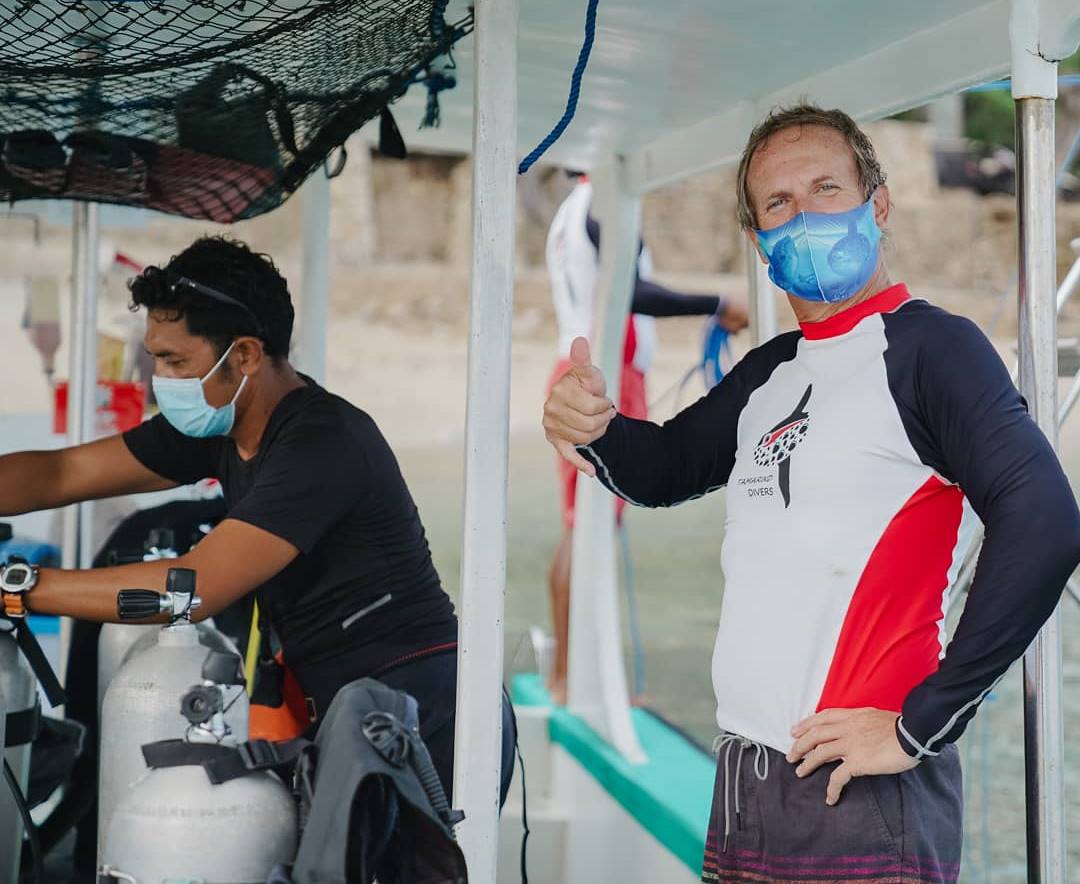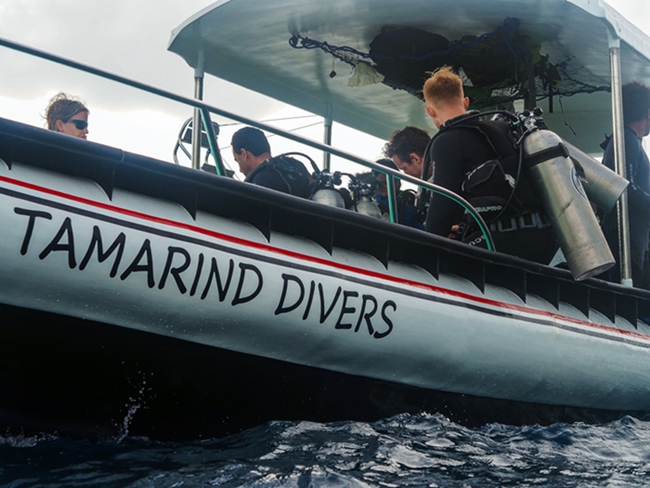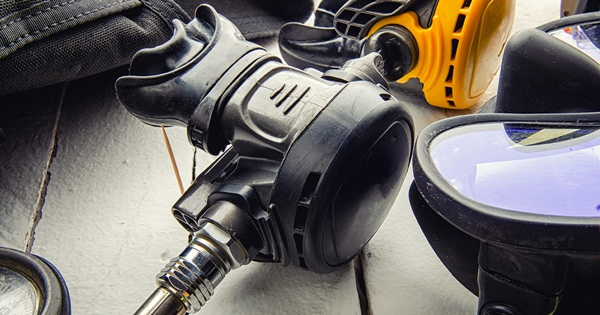Covid-19 and Diving
In view of the Covid-19 pandemic, divers may have questions relating to the risk of disease transmission when returning to diving. We at Tamarind Divers have consulted with DAN (Divers Alert Network) and PADI, along with medical specialists, to bring you the latest information as to what precautions we are taking to prevent spread of the disease. Although no business can guarantee zero risk, we feel that by implementing a proactive policy to manage and reduce the threat of COVID-19, and implementing it consistently, is key to reducing the risk of spreading this disease.
Our fully vaccinated (AstraZeneca) dive team are patiently waiting for you to join us diving again, and when you do, our #1 priority is to ensure the health and safety of all our guests and staff, so we have taken a few additional measures within our operation:
Dive Center Procedures
A few basic rules apply to everyone, including staff and customers, regardless of activity.
We will conduct temperature checks of all guests entering our dive center, with an infrared thermometer.
You will be asked to fill in a Health Declaration Form / Covid-19 before diving with us. This will normally be emailed to you in advance of your dive trip.
You also need to be medically fit to dive. PADI and DAN have updated the Diver Medical Questionnaire, which now covers Covid-19.
The following preventative measures will be in place to make your diving experience as safe as possible:
- Wash hands regularly and thoroughly with soap and water, for at least 20 seconds, or use an alcohol-based hand sanitiser (see FAQ), which will be available in the Dive Center and on our boat.
- Maintain a social distance of at least 1.0m, as required by Indonesian regulations and avoid direct contact with other people not in your group.
- Avoid touching your eyes, nose and mouth.
- Make sure you and your buddy follow good respiratory hygiene. Cough or sneeze into your elbow or a tissue, and dispose of the tissue right away.
- It is required in Indonesia for everyone to wear a cloth face covering in public settings, where other social distancing measures are difficult to maintain. This includes inside the Dive Center and on our boat. We do have a range of cool reusable face masks available for purchase!
- Guests will be required to use lockers to store personal items
- We do encourage guests to bring their own reusable water bottle, which can be re-filled from our drinking water dispenser.

Kit Preparation – All of our rental dive equipment will have been washed and disinfected prior to use. This includes sterilising regulator mouthpieces and second stages, masks, BCD inflators and snorkels. We normally prepare our guest’s equipment on the boat, but if you prefer, you can set your own kit up. Our staff will be using hand sanitizer and facemasks when setting up equipment.
Storing of personal equipment, including face masks – We require all of our guests to bring a small box on the dive boat, to store their face mask in, when they are not wearing it.
Mask cleaning – We always have a de-fog solution on our dive boat, so there should no need to perform potentially risky actions such as spitting in your mask.
Buddy checks – Avoid touching buddies’ equipment. Don’t breathe from the Alternate Air Source / Octopus, but ensure you purge the second stage to check for correct operation prior to jumping in the water. Check for inflate and deflate of your BCD, but don’t orally inflate. A visual check should be carried out, with self-demonstration and verbal confirmation.
Entries / Exits – Enter the water in your buddy teams under the instruction of your guide. All our PADI dive staff have been briefed in the correct procedures to minimise contact at the surface prior to beginning the dive.
Exit the water one at a time under the direction or your guide. Try to keep your mask on and regulator in place whilst you get back on the boat.
Lunch and drinks – We will continue to serve our delicious lunches during the surface interval. All lunches are packed into individual recyclable containers as per your order. Everyone will have their own cup for drinking water and tea / coffee.
Social distancing – We will be restricting the numbers of people on our dive boat to allow for social distancing of a minimum 1.0m. This means you will find yourself with lots more space!
Underwater social distancing isn’t needed, although we still insist on keeping your distance with some of our favourite marine creatures, such as turtles, manta rays and molas!!

Disinfection of Scuba Equipment
Wetsuits, fins and booties will be disinfected by our dive center staff, using Dettol (see FAQ). For items of dive equipment which will have come into contact with the mouth or nose, such as the following:
- Second Stage Regulator / Alternate Air Source
- Mask
- Snorkel
- BCD oral Inflator and bladder
We will be washing the dive equipment and then using 70% isopropyl alcohol (see FAQ) as an additional step to ensure there is no risk of disease transmission. If any of our guests have personal dive equipment, we will provide a separate rinse facility for them to safely wash and disinfect their equipment. All dive gear will be stored separately in our equipment room, which is only accessible by our staff. On a daily basis, we also will be disinfecting all surfaces which have been frequently touched. These include changing rooms, lockers, tables, chairs, door handles, bathrooms etc.

Frequently Asked Questions
What are the recommendations for hand washing?
The CDC (Center for Disease Control and Prevention) and WHO (World Health Organisation) specifically advises people to wash hands often with soap and water for at least 20 seconds, or use an alcohol-based hand sanitizer as a key preventative measure against the spread of Coronavirus COVID-19. A good quality disinfectant will help reduce risk to families. Our hand sanitisers use 70% isopropyl alcohol as the germ disinfection active ingredient, in line with CDC and WHO recommendations.
Is 70% alcohol an effective disinfectant for scuba equipment?
According to the WHO, a solution of 70% isopropyl alcohol with a contact time of 1 minute would inactivate the new coronavirus, meaning that the surface must stay wet for this amount of time.
Does Dettol kill the Coronavirus (COVID-19)?
2019 Novel Coronavirus (COVID-19) is a new strain of coronavirus. It is not yet available for commercial testing. Specific Dettol products have demonstrated effectiveness (>99.9% inactivation) against coronavirus strains from the same family as the 2019 Novel Coronavirus (COVID-19) in third party laboratory testing, when used in accordance with the directions for use. These products are: Dettol Antibacterial Surface Cleanser Spray, Dettol Antibacterial Surface Cleanser Wipes, Dettol All-In-One Disinfectant Spray, and Dettol Disinfectant Liquid. Given the structural similarities of the COVID-19 virus to the coronavirus strains tested previously (SARS-CoV, MERS-CoV, Human Coronavirus), and based on the evidence available to us, we would expect Dettol products (listed above) to be effective against the new strain. Definitive scientific confirmation of this, as with all other commercially available virucides, can only be provided once testing against COVID-19 Coronavirus has been conducted, following release of the strain by relevant health authorities.
Can a virus travel into a scuba tank?
Theoretically, the virus could enter the compressor through the air inlet, as the inlet filter is not able to block smaller droplets. The breathing air filters after the compression will also not provide assurance that small particles will be caught. It is therefore essential that the inlet to the compressor is located in a safe place to avoid any contamination. It has been shown that the virus is sensitive to high temperatures. When warm, a compressor can generate a gas temperature of more than 120°C, and in addition to this, very high temperatures are reached at the peak for compression, well above the virus resistance threshold. It is therefore unlikely that a virus can remain active after passing through the compressor. As an added precaution, our compressor staff will be wearing face masks and using hand sanitiser whilst filling tanks.
Can the virus survive in water?
Research is still ongoing, and it is not clear how long the SARSCoV-2 virus can survive in water. Studies on the SARS-CoV-1 virus (2003 epidemic) have shown that it remained infectious for long periods on the surface (lakes, rivers, wetlands, etc.). It appears that sea water is not able to neutralise the virus. In properly chlorinated or bromated pools and hot tubs, the CDC specifies that SARS-CoV-2 would be inactivated after a period of time. According to current evidence, it is therefore recommended that care is taken both when in the water and out of the water. This includes respecting distancing rules and properly washing and disinfecting equipment.
If I have had Covid-19, can I return to diving?
The Coronavirus pandemic has already had a devastating impact on the scuba diving world – but there’s another question on divers’ minds: ‘What happens if I get it? Can I dive after COVID-19?’
With scuba diving being allowed to resume in many locations, DAN has updated its guidelines for divers who are concerned about returning to the water. Although there is little practical information on the long-term impact of Covid-19 and scuba diving, the experience of DAN Europe physicians who have treated scuba divers who have suffered from Covid-19 has also been included in the update.
Medical Recommendations for Returning to Diving
Note: all fit-to-dive medical clearance tests should be performed by a specialist in diving (hyperbaric) medicine. Any cardiac (heart) or pulmonary (lung-function) tests performed due to Covid-19 should be interpreted and validated by a diving medical specialist as part of that process.
- Divers who have tested positive for Covid-19 but remained completely asymptomatic: wait at least 30 days from the first negative test before applying for fit-to-dive clearance and eventually going back to diving.
- Had symptomatic Covid-19: wait at least 30 days from the first negative test, plus an additional 30 days without symptoms (a total of two months) before applying for fit-to-dive clearance conducted by a diving medicine specialist.
- Hospitalised with Covid-19 or related pulmonary (breathing) problems: wait at least THREE months before applying for fit-to-dive clearance conducted or coordinated by a diving medicine specialist. The clearance should include complete pulmonary function testing, an exercise test with oxygen saturation measurement and a high-resolution CT scan of the lungs to verify a return to normal.
- Hospitalised with Covid-19 or related cardiac (heart) problems: wait at least THREE months before applying for fit-to-dive clearance conducted or coordinated by a diving medicine specialist. The clearance should include cardiac evaluation, including echocardiography and an exercise test (exercise electrocardiography) to ascertain normal cardiac function.
The full article published by DAN in Alert Diver can be found at www.alertdiver.eu/en_US/articles/what-you-should-know-about-diving-after-covid-19.
In the short-term, however, the advice is clear. SARS-CoV-2 can damage the lungs and the heart. Scuba diving with damage to any part of the cardiovascular system can lead to serious injury and death. Much as we might all wish to rush back into the water as soon as we can, doing so without proper medical consideration may cause more harm than good.
For further information, please contact us via the CONTACT form on our website, or email us at info@tamarinddivers.com